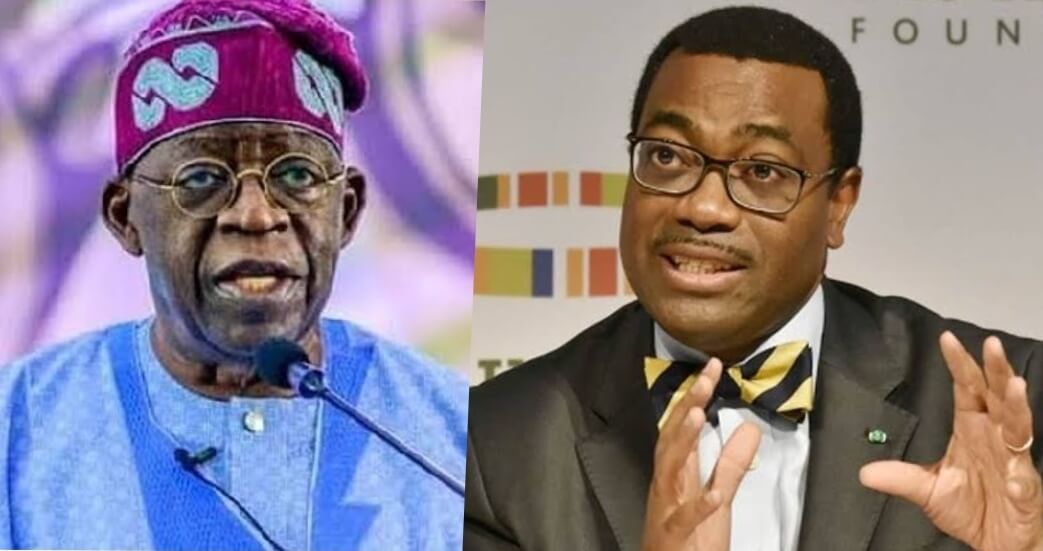Economic Challenges: ‘I Feel For President Tinubu’— AfDB President, Adesina
… Warns against Taking Commercial Loans, Issuing Euro Bonds
The President of the African Development Bank (AfDB), Akinwunmi Adesina, said he is sympathising with President Bola Ahmed Tinubu’s government over the economic challenges and has pledged $1.8bn in budget and other support.
Advertisement
About $1bn out of the amount will be issued as a concessionary loan to finance part of the 2024 budget.
Adesina during an interview monitored by THE WHISTLER said it is challenging to be the president of Nigeria in a time where efforts to moderate inflation, defend the naira and improve foreign exchange liquidity are inflicting hardship on Nigerians.
In a country where 133 million people live in multidimensional poverty according to a 2022 data, the new administration took up the challenge of purging the country from wasteful spending on fuel subsidy as well as floated the naira as recommended by the International Monetary Fund.
Also, the Central Bank recently increased benchmark interest rate to 22. 75 per cent and raised the Cash Reserve Ratio to 45 per cent
Advertisement
In what experts described as ‘being overwhelming’, the policies are leading to hardship. But the government has repeatedly defended its actions saying there is “no other way out”.
Adesina, who was a former Agriculture Minister, said, “It’s challenging to be a president. And I feel for President Tinubu, you know, with what he has to deal with on the macroeconomic side with inflation, with the depreciation of the currency, but also depletion of the foreign reserves to be able to do that. It is very difficult. So, think, you know, my view, and I came here to see him on the 14th of February, is to rally around and support him to succeed, because his success is actually our collective success.
“But there are a number of things that we’ve got to be able to do right, you know when you go to a medical doctor. Or somebody doing diagnostics and they ask you to do a scan. You do a scan, and the scan tells you all the wrong things, right? So, you can either close your eyes and say, I don’t want to see the scan, and you leave with a problem, right? Or you look at the scan and say, well, this is what a scan says and what must I do differently?”
Adesina said the Nigerian government is in dire need of support and the AfDB is willing to provide $1.8bn to aid the country.
He said, “There are a number of things that we’ve got to change. Our first and foremost is that in dealing with the fiscal challenge that we currently have today, I think the government is getting our strong support. We have a portfolio today of $4.6bn in Nigeria, and this year we expect to have a series of portfolios in Nigeria that we’re going to finance worth $1.76bn, which will include, by the way, a billion dollars of support that we are designing today for budget support and that will help a lot.
Advertisement
“Our loans are the cheapest you can ever find. You know, it’s almost like grants. Extremely concessionary. You pay one point something per cent on a loan. You pay for 40 years, and you have 10 years moratorium on it.”
Adesina warned the government against issuing Eurobonds or taking non concessionary loans from institutions.
He said, “Nigeria needs a lot more concession of finance. The country is over extended in terms of euro bonds, external debt and so on. You know, and as your currency depreciates, it means that the cost of financing your debt externally is so high and don’t forget, at the same time, you still have a lot of domestic debt that you have to clean up.
“So, I really believe that the issue is we’ve got to change is the amount of money that is inflowing into developing countries like Nigeria and others by making sure that we turn a trend that is not a good trend or a worrying trend. See, like in 2010. The total amount of external debt for Africa by the times of, you know, concessional debt, Paris Club debt, was probably about 57 per cent of it was concessional loans.
“Today it is 24 per cent. But more worrying is the fleet of commercial loans and euro bonds, commercial banks, and euro bonds. It used to be 10 per cent at that time. Today it’s 44 per cent. And those are short-term loans, done by commercial banks that are also high-interest rates and therefore, the more of the euro bonds you are issuing in short pieces like that, you have a situation of overlapping payments that you have to constantly keep on making at the same time your economy is weakening.”



